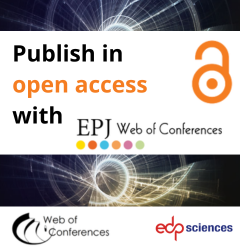Konferenzen > Physik > Astronomie, Astrophysik und Kosmologie
Wählen Sie ein Land aus
Armenien (1) - Australien (1) - Brasilien (4) - Deutschland (12) - Frankreich (3) - Griechenland (2) - Großbritannien (2) - Irland (1) - Italien (14) - Japan (4) - Kanada (1) - Kroatien (1) - Mexiko (2) - Peru (1) - Polen (5) - Portugal (1) - Republik Korea (1) - Schweiz (1) - Spanien (4) - Tschechische Republik (1) - Vereinigte Staaten (16) - Virtuelle Veranstaltung (1) - Österreich (2)
ALLE LÄNDER (81)
1
Carrollian physics and holography
01. Apr 2024 - 26. Apr 2024 • ESI, Vienna, Österreich
Eintrags-ID:
1580569
2
Anticipating the Rising Tide of Tidal Disruption Events: Theory and Observations
22. Apr 2024 - 25. Apr 2024 • Santa Barbara, Vereinigte Staaten
Eintrags-ID:
1519988
3
814. WE-Heraeus-Seminar — Heritage of SOFIA – Scientific Highlights and Future Prospectives
22. Apr 2024 - 26. Apr 2024 • University of Stuttgart, Deutschland
Eintrags-ID:
1602172
4
“Some Like It Hot!” A Journey from the Hot IGrM to the Multiphase CGM
22. Apr 2024 - 17. Mai 2024 • Garching, Deutschland
Eintrags-ID:
1557575
5
Teachers' Conference — Supermassive Black Holes and their Destructive Tidal Forces
24. Apr 2024 - 27. Apr 2024 • Santa Barbara, Vereinigte Staaten
Eintrags-ID:
1590256
6
AbSciCon 2024
05. Mai 2024 - 10. Mai 2024 • Providence, Rhode Island, Vereinigte Staaten
Eintrags-ID:
1530885
7
Loops 24
06. Mai 2024 - 10. Mai 2024 • Florida Atlantic University, Fort Lauderdale, Florida, Vereinigte Staaten
Eintrags-ID:
1517679
Webseite:
8
Alps I — Advanced Lectures in Physics in Switzerland: Quantum information, from gravity to computers and back
12. Mai 2024 - 17. Mai 2024 • Les Diablerets, Schweiz
Eintrags-ID:
1592497
9
Gravitational Wave Advanced Detector Workshop 2024
12. Mai 2024 - 18. Mai 2024 • Hamilton Island , Australien
Einsendeschluss für Abstracts:
28. Jan 2024
Eintrags-ID:
1592476
Webseite:
10
Minicourse on non-perturbative methods in QCD, quantum gravity and cosmology
13. Mai 2024 - 31. Mai 2024 • São Paulo, Brasilien
Eintrags-ID:
1600500
11
Speakable and Unspeakable in Quantum Gravity
13. Mai 2024 - 31. Mai 2024 • Saclay, Frankreich
Eintrags-ID:
1602826
12
IWM-EC 2024 — International Workshop on Multi facets of Equation of state and Clustering
21. Mai 2024 - 24. Mai 2024 • Catania, Italien
Eintrags-ID:
1568163
Webseite:
13
Habitability: The Astrophysical, Atmospheric and Geophysical Implications
21. Mai 2024 - 14. Jun 2024 • Garching, Deutschland
Eintrags-ID:
1557541
Webseite:
14
Lecture Sequence on Astronomy and Astrophysics
25. Mai 2024 - 30. Mai 2024 • Online, Virtuelle Veranstaltung
Eintrags-ID:
1604972
15
Standard cosmology at the threshold of change?
03. Jun 2024 - 06. Jun 2024 • Thessaloniki, Griechenland
Eintrags-ID:
1606810
Webseite:
16
Cosmic Signals of Dark Matter Physics: New Synergies
03. Jun 2024 - 06. Jun 2024 • Santa Barbara, Vereinigte Staaten
Eintrags-ID:
1519953
17
2024 Kudowa Summer School — 17th Kudowa Summer School
03. Jun 2024 - 07. Jun 2024 • Kudowa Zdroj, Polen
Eintrags-ID:
1594568
Webseite:
18
244th AAS Meeting — 244th meeting of the American Astronomical Society
09. Jun 2024 - 13. Jun 2024 • Madison, WI, Vereinigte Staaten
Eintrags-ID:
1553621
19
Black-Hole Microstructure VI
10. Jun 2024 - 14. Jun 2024 • IPhT, CEA Saclay, Frankreich
Eintrags-ID:
1580567
Webseite:
20
XIV Torino Workshop on AGB stars
10. Jun 2024 - 14. Jun 2024 • INAF - Observatory of Rome, Italien
Eintrags-ID:
1564615
Webseite:
21
SPIE Astronomical Telescopes + Instrumentation
15. Jun 2024 - 20. Jun 2024 • Yokohama , Japan
Eintrags-ID:
1565192
22
SPIE AS24 — SPIE Astronomical Telescopes + Instrumentation 2024
16. Jun 2024 - 21. Jun 2024 • Yokohama, Japan
Eintrags-ID:
1579644
Webseite:
23
CFT and Holography for Heavy and Thermal States and Black Holes
17. Jun 2024 - 21. Jun 2024 • Trinity College, Dublin, Irland
Eintrags-ID:
1615035
24
Summer School on Cosmology
17. Jun 2024 - 28. Jun 2024 • ICTP, Trieste, Italien
Eintrags-ID:
1581327
Webseite:
25
Quantum Aspects of Inflationary Cosmology
24. Jun 2024 - 19. Jul 2024 • Garching, Deutschland
Eintrags-ID:
1557628
26
Workshop — Neutrino Frontiers
25. Jun 2024 - 19. Jul 2024 • Firenze , Italien
Eintrags-ID:
1565488
27
S10 EAS2024 — Supernovae: now in 3D! @ the EAS2024
01. Jul 2024 - 02. Jul 2024 • PAdua, Italien
Eintrags-ID:
1606955
28
DPG-Lehrerfortbildung — Astronomie
01. Jul 2024 - 05. Jul 2024 • Physikzentrum Bad Honnef, Deutschland
Eintrags-ID:
1602081
29
MG17-2024 — 17th Marcel Grossmann Meeting on General Relativity
07. Jul 2024 - 12. Jul 2024 • Pescara, Italien
Eintrags-ID:
1611295
Webseite:
30
ML4ASTRO2 — International Conference on Machine Learning for Astrophysics
08. Jul 2024 - 12. Jul 2024 • Catania, Italien
Einsendeschluss für Abstracts:
10. Apr 2024
Eintrags-ID:
1612981
Webseite:
31
ISVHECRI 2024 — 22th International Symposium on Very High Energy Cosmic Ray Interactions
08. Jul 2024 - 12. Jul 2024 • Puerto Vallarta, Mexiko
Eintrags-ID:
1579665
Webseite:
32
CosmoVerse@Krakow
09. Jul 2024 - 11. Jul 2024 • Krakau, Polen
Eintrags-ID:
1596839
33
45th COSPAR Scientific Assembly and Associated Events
13. Jul 2024 - 21. Jul 2024 • Busan, Republik Korea
Eintrags-ID:
1553659
Webseite:
34
My Favourite Dark Matter Model
22. Jul 2024 - 26. Jul 2024 • Ponta Delgada, Portugal
Eintrags-ID:
1616060
Webseite:
35
Cosmological History: from Gravitational Waves to Exoplanets
29. Jul 2024 - 09. Aug 2024 • São Paulo, Brasilien
Eintrags-ID:
1600452
36
Mathematical Aspects of General Relativity
04. Aug 2024 - 09. Aug 2024 • Oberwolfach, Deutschland
Eintrags-ID:
1529808
Webseite:
37
Multi-messenger Transients — Multi-messenger Transients from Binary Mergers & Stellar Explosions
04. Aug 2024 - 25. Aug 2024 • Aspen, Colorado, Vereinigte Staaten
Eintrags-ID:
1583276
38
Rise_Time: Explosive Astrophysics in the era of High-Cadence Astronomy
07. Aug 2024 - 09. Aug 2024 • West Lafayette, Indiana, Vereinigte Staaten
Eintrags-ID:
1583498
39
Optimal Transport and Dynamics
11. Aug 2024 - 16. Aug 2024 • Oaxaca, Mexiko
Eintrags-ID:
1576693
40
MODEST-24 — Exploring Dense Stellar Systems Across Cosmic Time
19. Aug 2024 - 23. Aug 2024 • Warschau, Polen
Eintrags-ID:
1600198
Webseite:
41
The BRITE Side of Stars
20. Aug 2024 - 23. Aug 2024 • Wien, Österreich
Eintrags-ID:
1604156
Webseite:
42
Cosmic Dawn Revealed by JWST: The Physics of the First Stars, Galaxies, and Black Holes
26. Aug 2024 - 29. Aug 2024 • UC Santa Barbara, Vereinigte Staaten
Eintrags-ID:
1565341
43
Strong and Electro-Weak Matter 2024
26. Aug 2024 - 30. Aug 2024 • Frankfurt am Main, Deutschland
Eintrags-ID:
1614286
44
Eurostrings 2024
02. Sep 2024 - 06. Sep 2024 • Southampton, Großbritannien
Eintrags-ID:
1614941
Webseite:
45
Fundamental Physics UK
02. Sep 2024 - 06. Sep 2024 • Southampton, Großbritannien
Eintrags-ID:
1615006
Webseite:
46
IWARA2024 — 11TH INTERNATIONAL WORKSHOP ON ASTRONOMY AND RELATIVISTIC ASTROPHYSICS
02. Sep 2024 - 06. Sep 2024 • MACHUPICCHU PUEBLO (AGUAS CALIENTES), Peru
Eintrags-ID:
1611318
Webseite:
47
Advanced school on quantum spacetime
02. Sep 2024 - 06. Sep 2024 • Warschau, Polen
Eintrags-ID:
1614998
Webseite:
48
NOW 2024 — Neutrino Oscillation Workshop 2024
02. Sep 2024 - 08. Sep 2024 • Otranto (Lecce), Italien
Eintrags-ID:
1614614
Webseite:
49
Nuclear Physics in Astrophysics School
08. Sep 2024 - 15. Sep 2024 • Burg Stolpen, Deutschland
Eintrags-ID:
1614255
Webseite:
50
Galactic and extragalactic X-ray transients, theory and observational perspectives
09. Sep 2024 - 11. Sep 2024 • Warschau, Polen
Eintrags-ID:
1608962
Webseite:
51
XLXI International Meeting on Fundamental Physics
09. Sep 2024 - 13. Sep 2024 • Benasque , Spanien
Eintrags-ID:
1588916
52
ESPM-17 — 17th European Solar Physics Meeting
09. Sep 2024 - 13. Sep 2024 • Turin, Italien
Eintrags-ID:
1596802
Webseite:
53
High-Energy Plasma Phenomena in Astrophysics
09. Sep 2024 - 20. Sep 2024 • Garching, Deutschland
Eintrags-ID:
1557614
54
NPA-XI — Nuclear Physics in Astrophysics XI
15. Sep 2024 - 20. Sep 2024 • Dresden, Deutschland
Eintrags-ID:
1529465
Webseite:
55
WE Heraeus-EAS Early Career Researchers in Astronomy Workshop — The Nature and the Dynamics of Structures Observed in Galactic Disks
15. Sep 2024 - 20. Sep 2024 • Athen , Griechenland
Eintrags-ID:
1602078
56
The Fundamentals: Summer school in high-energy and gravitational physics
16. Sep 2024 - 21. Sep 2024 • Split, Kroatien
Eintrags-ID:
1614977
57
45th Course of the International School/Workshop of Nuclear Physics: "Nuclei in the laboratory and in stars"
16. Sep 2024 - 22. Sep 2024 • Erice, Italien
Eintrags-ID:
1614237
58
CSS2024 — Cosmology on Small Scales 2024: Local Hubble Expansion and Other Cosmological Puzzles
19. Sep 2024 - 21. Sep 2024 • Prag, Tschechische Republik
Eintrags-ID:
1604876
Webseite:
59
Witnessing Quantum Aspects of Gravity in a Lab
23. Sep 2024 - 27. Sep 2024 • São Paulo, Brasilien
Eintrags-ID:
1600648
60
RICAP-2024 — Roma International Conference on Astroparticle Physics
23. Sep 2024 - 27. Sep 2024 • Rom, Italien
Eintrags-ID:
1607003
Webseite:
61
3rd Rencontre PhyNuBE: Fission and Nuclear Astrophysics
06. Okt 2024 - 11. Okt 2024 • Oléron, Frankreich
Eintrags-ID:
1614155
Webseite:
62
The Dawn of Gravitational Wave Cosmology
06. Okt 2024 - 31. Okt 2024 • Benasque , Spanien
Eintrags-ID:
1588874
63
HEACOSS-2024 — High Energy Astrophysics and Cosmology in the era of all-sky surveys
07. Okt 2024 - 11. Okt 2024 • Yerevan, Armenien
Eintrags-ID:
1612893
Webseite:
64
International Conference on Particle Physics and Cosmology
21. Okt 2024 - 25. Okt 2024 • Kyoto, Japan
Eintrags-ID:
1524028
65
Quantum Extreme Universe: Matter, Information, and Gravity
21. Okt 2024 - 25. Okt 2024 • Okinawa Institute of Science and Technology, Japan
Eintrags-ID:
1614934
Webseite:
66
African Capacity Building Workshop on Space Weather and Ionospheric Research
22. Okt 2024 - 31. Okt 2024 • ICTP, Trieste, Italien
Eintrags-ID:
1580695
Webseite:
67
BIRS Workshop — Detection and Analysis of Gravitational Waves in the era of Multi-Messenger Astronomy: From Mathematical Modelling to Machine Learning
17. Nov 2024 - 22. Nov 2024 • Banff, Alberta, Kanada
Eintrags-ID:
1559745
68
Fundamental Physics meets Current and Future Facilities in Cosmology
02. Dez 2024 - 13. Dez 2024 • São Paulo, Brasilien
Eintrags-ID:
1600580
69
245th AAS Meeting — 245th meeting of the American Astronomical Society
12. Jan 2025 - 16. Jan 2025 • National Harbor, MD , Vereinigte Staaten
Eintrags-ID:
1083080
70
Bad Honnef Physics School — Searching for Quantum Gravity in the Sky
16. Feb 2025 - 21. Feb 2025 • Physikzentrum Bad Honnef, Deutschland
Eintrags-ID:
1601900
71
School — Frontiers in Nuclear and Hadronic Physics 2025
24. Feb 2025 - 07. Mär 2025 • Firenze , Italien
Eintrags-ID:
1589842
72
School — Theoretical Aspects of Astroparticle Physics, Cosmology and Gravitation – 2025
17. Mär 2025 - 28. Mär 2025 • Firenze , Italien
Eintrags-ID:
1589898
73
Generalized Symmetries: High-Energy, Condensed Matter and Mathematics
07. Apr 2025 - 10. Apr 2025 • Santa Barbara, Vereinigte Staaten
Eintrags-ID:
1590215
74
Planets on the Edge
05. Mai 2025 - 08. Mai 2025 • Santa Barbara, Vereinigte Staaten
Eintrags-ID:
1590194
75
246th AAS Meeting — 246th meeting of the American Astronomical Society
04. Jun 2025 - 08. Jun 2025 • Anchorage, AK, Vereinigte Staaten
Eintrags-ID:
1566877
76
Gravity - New perspectives from strings and higher dimensions
06. Jul 2025 - 18. Jul 2025 • Benasque , Spanien
Eintrags-ID:
1588812
77
Bad Honnef Physics School — A New Era in Exoplanet Atmosphere Observation and Characterisation
20. Jul 2025 - 25. Jul 2025 • Physikzentrum Bad Honnef, Deutschland
Eintrags-ID:
1601880
78
Understanding cosmological observations
20. Jul 2025 - 02. Aug 2025 • Benasque , Spanien
Eintrags-ID:
1588879
79
247th AAS Meeting — 247th meeting of the American Astronomical Society
04. Jan 2026 - 08. Jan 2026 • Phoenix, AZ, Vereinigte Staaten
Eintrags-ID:
1401316
80
252nd AAS Meeting — 252nd meeting of the American Astronomical Society
11. Jun 2028 - 15. Jun 2028 • Madison, WI, Vereinigte Staaten
Eintrags-ID:
1566887
81
255th AAS Meeting — 255th meeting of the American Astronomical Society
09. Jan 2030 - 14. Jan 2030 • National Harbor, MD, Vereinigte Staaten
Eintrags-ID:
1566864
Conference-Service.com stellt der Öffentlichkeit ein Kalendarium wichtiger Konferenzen, Symposien und sonstiger Tagungen im wissenschaftlich-technischen Bereich zur Verfügung. Obwohl das Verzeichnis mit großer Sorgfalt zusammengestellt und ständig aktualisiert wird, weisen wir auf die Möglichkeit von Fehlern ausdrücklich hin. Bitte vergewissern Sie sich immer beim Veranstalter, bevor Sie über die Teilnahme oder Nichtteilnahme an einer Konferenz entscheiden.
Kein Tracking | Keine Pop-ups | Keine Animationen
Stand vom 19. April 2024



